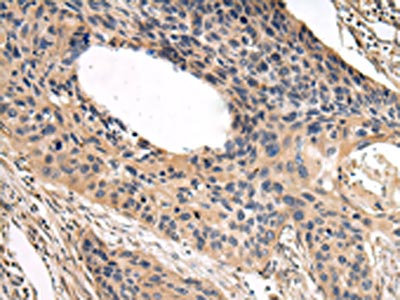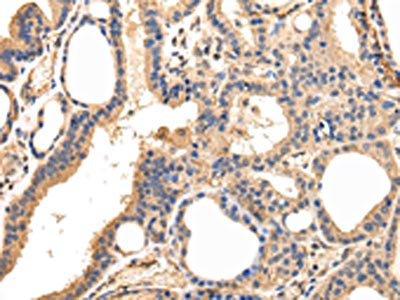
The image on the left is immunohistochemistry of paraffin-embedded Human esophagus cancer tissue using CSB-PA200282(USP15 Antibody) at dilution 1/35, on the right is treated with fusion protein. (Original magnification: x200)
USP15 Antibody
CSB-PA200282
ApplicationsELISA, ImmunoHistoChemistry
Product group Antibodies
ReactivityHuman, Mouse, Rat
TargetUSP15
Overview
- SupplierCusabio
- Product NameUSP15 Antibody
- Delivery Days Customer20
- ApplicationsELISA, ImmunoHistoChemistry
- CertificationResearch Use Only
- ClonalityPolyclonal
- ConjugateUnconjugated
- Gene ID9958
- Target nameUSP15
- Target descriptionubiquitin specific peptidase 15
- Target synonymsUNPH-2, UNPH4, ubiquitin carboxyl-terminal hydrolase 15, deubiquitinating enzyme 15, ubiquitin thioesterase 15, ubiquitin thiolesterase 15, ubiquitin-specific-processing protease 15
- HostRabbit
- IsotypeIgG
- Protein IDQ9Y4E8
- Protein NameUbiquitin carboxyl-terminal hydrolase 15
- Scientific DescriptionThis gene encodes a member of the ubiquitin specific protease (USP) family of deubiquitinating enzymes. USP enzymes play critical roles in ubiquitin-dependent processes through polyubiquitin chain disassembly and hydrolysis of ubiquitin-substrate bonds. The encoded protein associates with the COP9 signalosome, and also plays a role in transforming growth factor beta signalling through deubiquitination of receptor-activated SMAD transcription factors. Alternatively spliced transcript variants encoding multiple isoforms have been observed for this gene, and a pseudogene of this gene is located on the long arm of chromosome 2.
- ReactivityHuman, Mouse, Rat
- Storage Instruction-20°C or -80°C
- UNSPSC41116161





